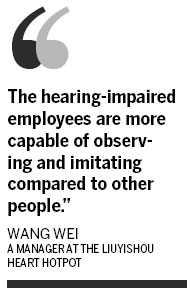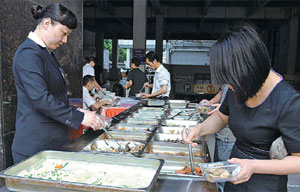Beyond words
Updated: 2013-06-06 06:19
By Wu Ni (China Daily)
|
||||||||
 |
|
Each table at Liuyishou Heart Hotpot has heart-shaped paper boards with which customers can order and ask for other services. Cui Jun / For China Daily |
A chain of hotpot restaurants trains hearing-impaired staff to be star waiters, Wu Ni reports in Shanghai.
Yang Weilin greets every customer entering the restaurant with a big smile. He claps his hands and puts his palms upward, but does not say a word.
The young waiter is saying welcome in sign language. Together with the 29 other waiters and waitresses who can't speak or hear, they provide silent service to customers at Liuyishou Heart Hotpot in Minhang district, Shanghai.
Claiming to be the only restaurant in the city that hires hearing-impaired staff, Liuyishou recently celebrated its one-year anniversary on May 20, the National Day of Assisting Disabled Persons.
Waiters like Yang account for half of the restaurant's 60 employees, according to Wang Wei, manager in charge of the employees, and a few tactics were employed to eliminate communication obstacles between customers and disabled employees.
"The hearing-impaired employees are more capable of observing and imitating compared to other people," Wang says, adding that most became qualified waiters and waitress after training.
 |
|
Yang Weilin communicates with a customer in sign language. Wu Ni / China Daily |
Yang, 29, from Lezhi county of Sichuan province, has been a model employee because of his intelligence. With a notebook in his pocket and an electronic bracelet on his left wrist, Yang strolled through the restaurant, greeting diners and responding to their calls.
Each table is equipped with different color, heart-shaped paper boards, on which are written "add dishes", "add drinks", "pay bill" and so on. When customers hold up the cards, Yang and his colleagues provide the requested service.

A service pager also sits on every table. If customers have any demands during their meal, they can press the button and the signal is transferred to the electronic bracelet that shakes to remind the waiters of the demands.
On the wall, a poster illustrates how to refer to various food and tableware in sign language, which enables customers to use their hands to tell waiters what they want.
If the wordless communication fails, a notebook and pen are always available.
"Some customers might get impatient," says Wang Wei, the manager, who says the restaurant always has two employees with normal hearing on duty for every six who cannot hear.
Most customers are satisfied with the employees, and there are customers who come especially for the silent service, Wang says.
Zhang Hong, a frequent diner at the hotpot restaurant, says she does not sense much difference between the disabled waiters and others, "they are very considerate and often help to replace our used plates with clean ones or add water or drinks even before we ask".
Zhang says that she frequents the restaurant partly because of the employees: "I want to show my support, after all, it is not easy to find a job for these disabled people."
All the employees are treated the same in every aspect, according to Wang, "because they are sensitive and what they care about most is equality".
Yang earns 2,200 yuan ($359) every month, modestly above the city's minimum wage of 1,620 yuan. The restaurant provides free training and free meals for staff on duty as well as paying for medical expenses and accommodation.
Born to a well-off family, Yang does not necessarily need a job to live but he insists on working. His last job was also a waiter in a restaurant in Chengdu, capital of Sichuan province.
Writing on a palm-size notebook with a ballpoint, Yang says that restaurant work is tiring but he feels happy because he can earn a living all by himself. "I have saved about 10,000 yuan. I hope to buy a new house in my hometown," writes the shy young man.
For Tian Zhiqiang, Yang's colleague, the restaurant is also a place to show off his talent. The 23-year-old man used to work in a factory making packages in his hometown in Baojing county of Hunan province.
Now Tian, as a street dance star of the restaurant, performs for diners at about 7 pm every weekend.
"I fell in love with the dance when I was 20. Like most fans of Michael Jackson, I imitate him based on Internet videos. I have so much fun performing here," he writes.
Zhang Tiansong, general manager of the hotpot restaurant, says that the founder of the Liuyishou Hotpot Group from Chongqing lost his left arm in a traffic accident, and the restaurant aims to help those with disabilities, who are generally marginalized, to become active members of society.
Including Shanghai, the group has set up seven public-welfare hotpot restaurants in Beijing, Chongqing and other cities, providing jobs for 300 disabled employees, Zhang says.
Employment is crucial for China's massive disabled population to adapt to normal life. Statistics from the China Disabled Person's Foundation show that 27.8 million Chinese have hearing disabilities, but only a limited number of jobs are open to them.
China's National Human Rights Action Plan (2012-15) provides that the country will stabilize and expand employment for the disabled.
The State will provide employment services and vocational training for disabled people who seek employment, and make sure that an additional 800,000 disabled people are employed by 2015.
|
|
|

 'Taken 2' grabs movie box office crown
'Taken 2' grabs movie box office crown
 Rihanna's 'Diamonds' tops UK pop chart
Rihanna's 'Diamonds' tops UK pop chart
 Fans get look at vintage Rolling Stones
Fans get look at vintage Rolling Stones
 Celebrities attend Power of Women event
Celebrities attend Power of Women event
 Ang Lee breaks 'every rule' to make unlikely new Life of Pi film
Ang Lee breaks 'every rule' to make unlikely new Life of Pi film
 Rihanna almost thrown out of nightclub
Rihanna almost thrown out of nightclub
 'Dark Knight' wins weekend box office
'Dark Knight' wins weekend box office
 'Total Recall' stars gather in Beverly Hills
'Total Recall' stars gather in Beverly Hills
Most Viewed
Editor's Picks

|

|

|

|

|

|
Today's Top News
Shenzhou X astronaut gives lecture today
US told to reassess duties on Chinese paper
Chinese seek greater share of satellite market
Russia rejects Obama's nuke cut proposal
US immigration bill sees Senate breakthrough
Brazilian cities revoke fare hikes
Moody's warns on China's local govt debt
Air quality in major cities drops in May
US Weekly

|

|










